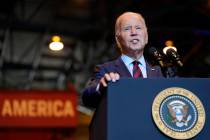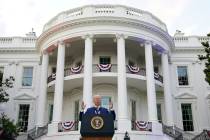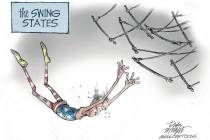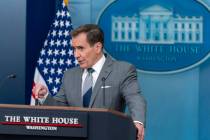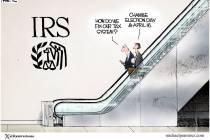Costs? What costs?
ObamaCare -- barring the slim chance it gets repealed -- is going to cost lots of people lots of money. Many of those costs will be concealed or shifted. Huge new Medicaid costs, for instance, eventually will be imposed on the states.
Not all the costs can be hidden, though. For instance, the new law will eliminate -- starting in 2013 -- a tax deduction that large companies were given by Congress in 2003 as an incentive to continue providing prescription drug coverage to their retired employees. (Otherwise, Congress would have had to admit Medicare "Part D" would cost more than they were saying.)
SEC regulations required the firms to promptly announce their estimates of what the tax change will cost them, and to "write down" that charge -- hundreds of millions of dollars, in some cases -- against their earnings now, rather than waiting until the change takes effect.
That didn't stop White House political henchmen (including top dog Rahm Emanuel) from phoning the Washington offices of those outfits a week ago, accusing them of announcing the projected costs as part of some Republican plot to make Democrats and their new entitlement look bad.
As part of that full-court press defense, Commerce Secretary Gary Locke prepared an opinion piece that appeared in the April 1 Wall Street Journal. ObamaCare will actually save American businesses money over time, Mr. Locke insists, savings that will "far outweigh the impact of this small tax provision. ...
"Critics have seized on this accounting adjustment to suggest these costs -- as much as $1 billion in one company's case -- are going to place immediate and substantial burdens on America's businesses," Mr. Locke wrote. "That's disingenuous."
Really? The reason the SEC requires the announcements is that the writedowns will impact dividends paid on those companies' stocks in the coming year.
Mr. Locke -- a lawyer and former governor of Washington -- argues ObamaCare will save businesses money by placing "a fee on insurance companies' most expensive plans that independent experts agree will put downward pressure on the long-term growth of health costs."
Because this "fee" won't buy any service, it's not a fee at all. It's a tax -- one of many included in the measure. But is it really possible that adding a tax (or even a "fee") can make medical equipment, medical labor or pharmaceuticals cost less?
ObamaCare will help businesses save money by "empowering an Independent Payment Advisory Board to keep Medicare cost growth in check and promote payment and health delivery system reforms," writes Mr. Locke.
Is Mr. Locke guaranteeing that employers' Medicare payroll taxes will go down? When?
Besides, most Americans would call what Mr. Locke's describing here as rationing and refusing to pay doctors' bills in full.
Mr. Locke may be a fine fellow, but he was an odd choice for commerce secretary, the ideal post in which Mr. Obama could have installed at least a token businessman, in a Cabinet listing heavily toward career politicians and others who've never met a payroll.
Does he really understand what being forced to fund a huge new entitlement bureaucracy will do to an American private sector already on the respirator?
In fact, "Most of these people have never had a real job in their lives," a senior lobbyist for one of the firms declaring the writedowns told the American Spectator last week. "They don't understand a thing about business, and that includes the president."








